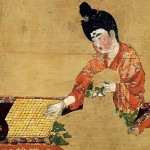Monthly Archives: February 2015
Weiqi and Creativity
by Patrick Anderson •
While I can’t say if I really enjoyed the reading this week it did bring up an interesting portion of games that is often overlooked, and definitely isn’t something we’ve really talked about in class, how games can be a powerful means of self expression. Though the creation of games is obviously an expressive action,…
Week 6 response
by Skye •
I thought the reading were informative but rather difficult to understand. I guess because I do not view games the same ways as the authors of these articles do. Games, to me, are not aesthetically pleasing.. Yes the boards that weiqi is played on and the Chinese cards are beautiful. However, the meaning of beautiful, to…
Liubo image
by Alexina •
Week 6
by Alexina •
Nothing is true; everything is permitted or: BotRT 1
by Griffin H. •
Figure 15:9, a-b, Art of Contest: Weiqi
by cjakob •
Figure 15:9, a-b Manuscript of the Qi Jing (Classic of Weiqi) Since my reading response was based on the importance of written manuals to the survival of games, I thought it would be fitting to describe the weiqi manual depicted in the Art of Contest. Dating to the middle of the sixth century, the weiqi manual is…
Rules
by cjakob •
The study of cultural pass-times can become particularly difficult when studying aspects that no longer survive. Even games that enjoyed a particularly long span of popularity are easily lost to the sands of time. Liubo, game of leaves, and boyi, are all once widely understood ancient games that today only serve to confuse modern scholars.…
Week 6 To-Do
by Maggie Greene •

By Wednesday evening (2/18: also the eve of Spring Festival (春節), or the lunar new year! Happy lunar new year – 春節快樂!), please post a reading response for the essays. In addition (as with previous weeks), please select an image from the Art of Contest essays to discuss. I’ve posted a reading guide for the readings…
Link
Monopoly’s Inventor: The Progressive Who Didn’t Pass ‘Go’ – The New York Times
